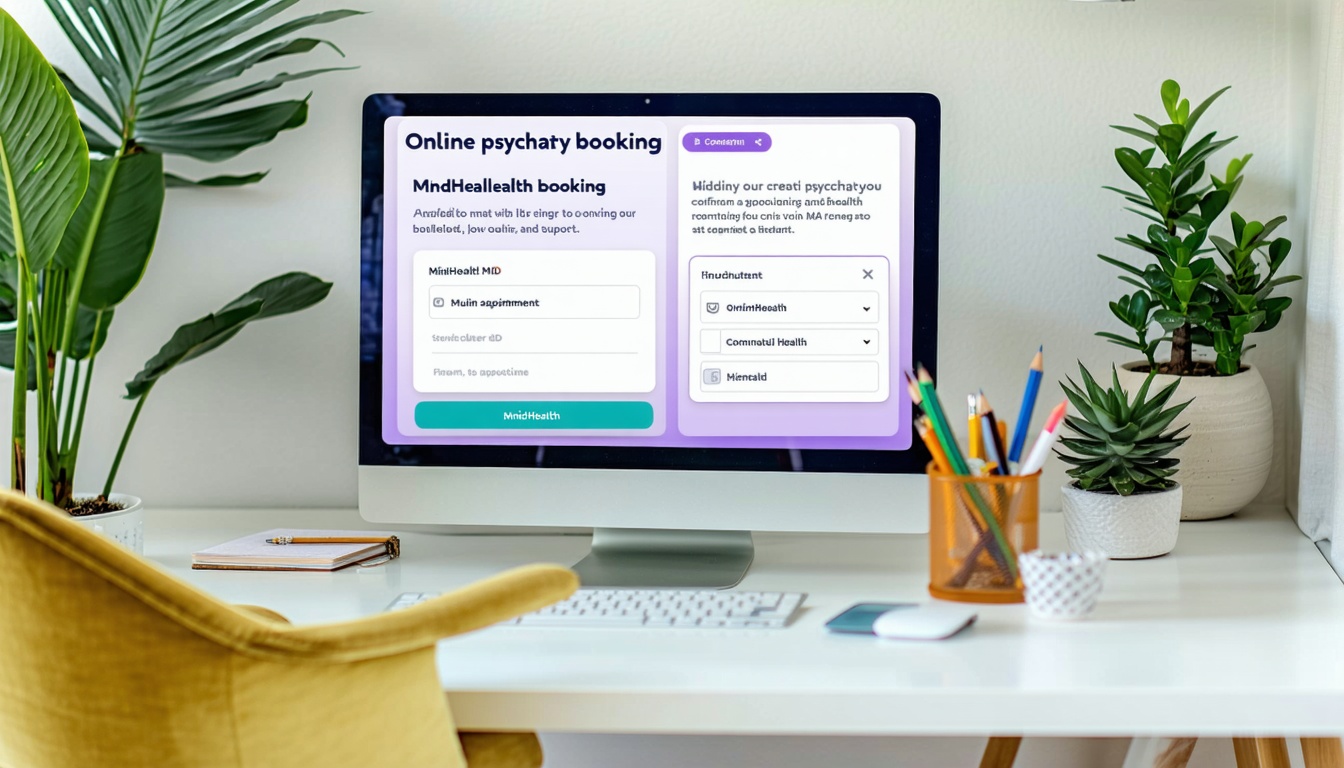Understand OCD and your treatment options
Obsessive-compulsive disorder (OCD) can feel overwhelming, and if you’re looking for an OCD treatment psychiatrist to guide you or a loved one, you’re on the right track. OCD can cause repetitive, distressing thoughts (obsessions) and behaviors (compulsions) that may interfere with everyday life. Fortunately, you have more treatment choices than ever before. Many people find relief through combined methods, such as proven therapies and medication, and this often starts with understanding exactly what OCD is and how professionals tackle it.
What is OCD?
OCD is often described as a cycle of unwanted thoughts (like worrying excessively about germs) and rituals (like repeated handwashing) that temporarily reduce anxiety. This cycle can be frustrating, especially when you notice it interfering with your personal, academic, or work life. Researchers estimate that OCD impacts around 1.6 to 2.3 percent of adults in the United States [1].
Because OCD can develop in childhood, adolescence, or early adulthood, not everyone receives a diagnosis right away. In fact, you might have coped with symptoms solo for years. But no matter when it arises, effective help is out there.
Why early intervention matters
Early treatment for OCD can prevent patterns from becoming too entrenched. By addressing symptoms as soon as you notice them, you may reduce their severity, limit complications, and enjoy a better long-term outlook. According to the Mayo Clinic, OCD is often chronic, so ongoing care and management techniques become vital. If you suspect OCD, consider talking to a mental health professional sooner rather than later.
Recognize the role of an OCD treatment psychiatrist
When you’re living with intrusive thoughts and repetitive actions, it’s tempting to do your own research and try self-help tips. But sometimes, the complexity of OCD calls for a psychiatrist trained in diagnosing and managing psychiatric conditions, including OCD. A great specialist can offer you or your loved one a personalized plan, guiding you each step of the way toward regaining control.
Essential qualifications
A psychiatrist focusing on OCD typically has specialized training in disorders where obsessions and compulsions are a hallmark. They stay current with industry evidence: medication protocols, therapy techniques, and emerging technologies like transcranial magnetic stimulation (TMS). Many psychiatrists also collaborate with psychologists, ensuring you get a cohesive plan that addresses everything from medication side effects to the nitty-gritty details of exposure therapy.
In most cases, you’ll want someone with ample experience prescribing medication for OCD. According to the International OCD Foundation, not all antidepressants effectively treat OCD. Serotonin reuptake inhibitors (SRIs) and selective serotonin reuptake inhibitors (SSRIs) remain the most recommended drugs, and a psychiatrist can determine whether a certain medication (and dosage) might fit your situation best.
Collaborative care approach
OCD symptoms don’t happen in isolation; they can affect relationships, school or work performance, and physical health. That’s why it’s essential to find a psychiatrist who teams up with other professionals. At MindHealth MD, each case is carefully evaluated from multiple angles, including potential co-occurring conditions like anxiety disorders or substance use issues. When a psychiatrist works with different specialists—therapists, primary care physicians, or TMS technicians—you benefit from a holistic approach that targets the root of your symptoms and paves the way for meaningful relief.
Key methods used in OCD care
Effective OCD management typically involves therapy, medication, or a blend of both. The exact combination you choose can depend on the nature of your symptoms, personal preferences, and general health. Over time, many people discover that each method supports the other, building a strong foundation for recovery.
Cognitive behavioral therapy (CBT)
Cognitive behavioral therapy is one of the most popular approaches for OCD. It focuses on examining and reshaping the thoughts that underlie anxiety-provoking obsessions. CBT aims to help you spot harmful patterns, challenge negative assumptions, and gradually learn new perspectives. The transformative part about CBT is the emphasis on practical techniques that you can take into your everyday life, so you gain confidence in managing triggers rather than avoiding them.
ERP and its importance
Exposure and Response Prevention (ERP), often considered the gold standard for OCD, is a specialized form of CBT. With ERP, you gently face the object or situation that sparks your obsessive fear. Think of a person who worries excessively about dirt: the therapy might start with them touching a slightly dusty surface, then resisting the usual handwashing ritual for a chosen amount of time. Over repeated sessions, your mind learns that you can handle the anxiety without resorting to compulsions, decreasing the cycle’s grip on your life. Although ERP takes practice, many people find it uniquely beneficial [2].
Medication overview
Medication can be a vital ally in tackling intrusive thoughts and compulsions. Psychiatrists often choose from a class of medications known as SSRIs, such as fluoxetine or sertraline. These medications adjust your brain’s serotonin levels, helping quiet the volume of obsessive thoughts. You might need higher doses than typically prescribed for depression, and improvements could take 8 to 12 weeks to become noticeable. If SSRIs don’t bring sufficient relief, other interventions—like clomipramine or combining multiple therapies—are options your psychiatrist can explore.
SSRIs and more
SSRIs such as fluvoxamine or paroxetine are commonly tried first for OCD, thanks to their relative safety and tolerability. However, some people respond better to older tricyclic antidepressants like clomipramine. Because each body is different, the best medication for you might require a bit of experimentation. A specialized OCD treatment psychiatrist keeps tabs on side effects, monitors your progress, and may recommend adjusting dosages or adding new treatments, such as TMS, if necessary.
Why choose MindHealth MD for OCD treatment
When you need a trusted resource for your mental health, MindHealth MD offers comprehensive telehealth psychiatry, medication-assisted treatment (MAT), and advanced TMS solutions. Our approach aligns evidence-based modalities with real-life convenience. Whether you’re seeking an in-person or virtual option, we want to make it easier to connect and stay committed to your recovery goals.
Accessible telehealth psychiatry
Sometimes, the greatest barrier to treatment is simply getting to the therapist’s office. Busy schedules, mobility issues, or just the stress of driving across town can stop you from booking that all-important visit. MindHealth MD addresses this by offering telepsychiatry appointments that allow you to speak face-to-face with a qualified psychiatrist online. This approach can be especially helpful if you need ongoing support for OCD without uprooting your whole day to attend sessions.
With telehealth, everything is done through secure video calls, and you still receive the same level of attention and empathy you’d expect in person. You partner with professionals who can evaluate your symptoms, discuss medication changes, and offer therapy suggestions—without your even having to leave home. If you do need urgent care, you can look into an immediate psychiatry appointment for time-sensitive concerns.
Advanced TMS solutions
Transcranial magnetic stimulation (TMS) delivers magnetic pulses to target brain areas linked to mood regulation and obsessive thinking. While TMS is an established treatment for depression, growing research also shows promise for OCD in certain cases. If your symptoms don’t respond well to standard therapy or medication, TMS might provide added relief.
At MindHealth MD, you can schedule TMS treatment with a specialist who stays updated on the latest OCD research. We partner with transcranial magnetic stimulation providers to ensure every step—evaluation, therapy, and follow-up—feels cohesive. TMS isn’t invasive, and many people improve over several sessions with minimal side effects.
MAT for co-occurring conditions
OCD can bump shoulders with other disorders, including addiction or substance use challenges. If you struggle with both, medication-assisted treatment, or MAT, might be a life-changing option. Medication assisted treatment combines specific prescription medications with therapy and support services to address substance use. This strategy helps you manage triggers, reduce cravings, and stay focused on your broader mental health goals.
You can also explore more specialized programs such as mat for opioid addiction or mat for alcohol dependency. Because OCD can sometimes worsen under the stress of withdrawal or active substance use, receiving combined care through MindHealth MD gives you a stronger shot at regaining balance.
Finding the best psychiatrist for your needs
Whether you’re just discovering your symptoms or have been battling OCD for years, finding a psychiatrist who matches your needs is crucial. Here’s how you can streamline that decision-making process and set the stage for a supportive long-term partnership.
Questions to ask your potential specialist
-
“What is your experience treating OCD?”
A solid background in exposure therapy, SSRIs, and complex cases means they can confidently tailor a plan for you. -
“Are you board-certified in psychiatry?”
Board certification indicates that they maintain high standards of knowledge and remain updated on cutting-edge treatments. -
“How do you measure treatment progress?”
Make sure they have a system for tracking improvements, whether it’s symptom scales, session feedback, or therapy milestones. -
“Do you work with other professionals?”
A psychiatrist who collaborates with psychologists, counselors, or TMS specialists can give you a more comprehensive, joined-up experience. -
“What happens if a particular treatment isn’t effective?”
A thoughtful psychiatrist has a plan in case your first medication doesn’t deliver the relief you need. Possibly, that plan might involve adjusting dosages, trying new medications, or exploring a TMS evaluation.
Insurance and affordability considerations
OCD treatment can involve multiple sessions, follow-ups, and medication costs. To keep expenses manageable, ask about insurance coverage or out-of-pocket estimates. Many psychiatrists partner with insurance providers, and MindHealth MD prides itself on in network psychiatry care. If your insurance doesn’t cover specific services, inquire about self-pay rates or payment plans that allow you to continue care without financial strain. You can also find clarity on coverage by checking insurance accepted psychiatry for your plan details.
In-network vs. out-of-network
If you pick an in-network psychiatrist, your insurer typically covers a larger portion of the cost, reducing out-of-pocket expenses. Out-of-network providers often lead to higher patient costs, but some insurance plans do allow partial reimbursement. Taking a moment to verify coverage before your first session can help you relax and focus on treatment.
Practical tips for living with OCD
Therapy and medication aren’t the only aspects to consider when you’re managing OCD. Lifestyle and personal strategies can also make a significant difference in how you cope day-to-day. With the right support from your psychiatrist, plus these practical tips, you’ll gradually transform your relationship with intrusive thoughts.
Building a support system
- Involve trusted friends or family: Let them know how OCD affects you. If they understand why you need to avoid certain triggers or set new routines, they can lend a supportive hand.
- Connect through peer groups: Your psychiatrist might recommend support groups (online or in-person) where you can meet others on a similar path, share coping tips, and celebrate each other’s wins.
- Seek professional guidance: Even if you feel you’re managing, periodic check-ins can keep you on track, update medication doses, or adjust therapy goals. If your symptoms escalate at any point, a quick book psychiatric appointment can help you avoid a deeper crisis.
Self-care strategies
- Practice mindfulness: Simple relaxation exercises, like focusing on your breath, can bring you back to the present whenever anxious thoughts crowd your headspace.
- Keep a journal: Writing down your worries and observations helps identify patterns and track progress. Journaling can become a safe place to “offload” intrusive thoughts.
- Stay physically active: Even light exercise, like walking or yoga, can have mood-boosting effects. It may also reduce stress and help you sleep better.
- Respect your boundaries: Therapy homework like ERP can be challenging, but it’s crucial to pace yourself. Pushing yourself too hard might backfire, so communicate openly with your psychiatrist about your comfort level.
FAQs about OCD treatment
-
What are the most common OCD treatments?
The two core treatments are psychotherapy—particularly CBT with ERP—and medication, usually SSRIs or other SRIs. According to the Cleveland Clinic, a combination of therapy and medication often proves most effective. -
Can you cure OCD through medication alone?
Medication rarely cures OCD but helps control symptoms so they don’t dominate your life. A significant portion of people find improvement with medication, but full remission isn’t guaranteed. Combining medication with therapy, however, tends to yield better and longer-lasting results. -
How long does OCD treatment usually last?
It varies. Some people see enough relief within a year to gradually reduce medication, while others need ongoing or even long-term treatment. The Mayo Clinic mentions that OCD is typically chronic, meaning continuous management strategies are key. -
What if therapy or standard medication doesn’t work?
If first-line treatments aren’t effective, your psychiatrist may adjust doses, switch medications, or recommend TMS. In more resistant cases, options like deep brain stimulation might be explored. It’s essential to keep communicating about what is and isn’t working for you. -
Can telehealth psychiatry treat OCD effectively?
Yes. With telehealth, you can still receive top-tier therapy, medication management, and specialized advice. Many people find virtual care convenient, and it’s an effective option for those who live far from specialists or have busy schedules.
Conclusion
OCD may be a chronic condition, but that doesn’t mean you’re stuck living with spiraling thoughts and compulsions forever. With the right support, modern treatments, and an OCD treatment psychiatrist who understands the intricacies of care, you can reshape your daily life. Effective therapy, carefully chosen medication, and lifestyle strategies all work hand in hand to break the vicious cycle of obsessions and compulsions.
When you decide to tackle OCD proactively, you’re not just easing symptoms—you’re opening the door to improved relationships, higher productivity, and a healthier sense of self. The process often involves gradual progress rather than overnight miracles, so be patient. A supportive care team—like the one at MindHealth MD—can accompany you at each stage, from diagnosis to maintenance sessions. Whether you prefer weekly telehealth visits, are curious about TMS, or need specialized help for co-occurring conditions, remember that there are solutions for you or your loved one.
Ready to take the next step? Look into a virtual psychiatry session if you prefer online appointments, or schedule TMS treatment if you want to explore advanced therapy options. By working with MindHealth MD, you can face OCD with the reassurance that a devoted team is eager to see you succeed. Each session will bring you closer to the manageable life you deserve. Let the healing journey begin.








